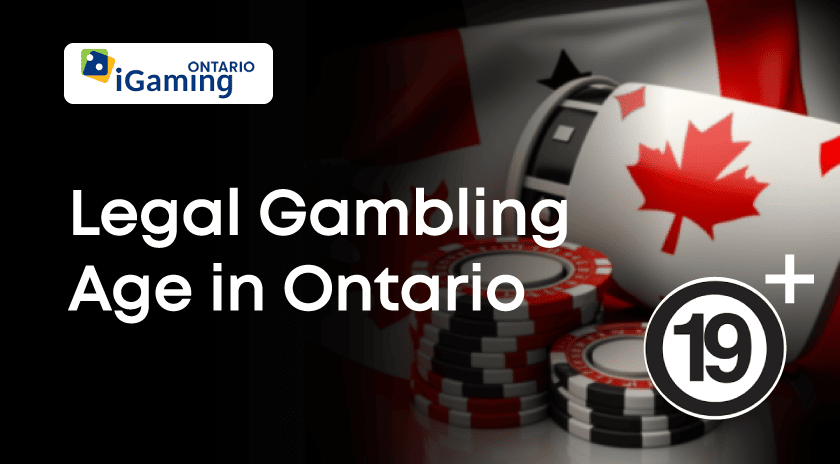Legal Gambling Age at Ontario Casinos
Here is an overview of the legal minimum gambling age in Ontario, focusing on the roles of the AGCO and iGaming Ontario. We highlight the importance of KYC policies, geolocation checks, and age verification processes to ensure that participants meet legal requirements.

Minimum Gambling Age in Ontario
In Ontario, legal gambling ages are established to manage access to various gambling activities, ensuring participants are of a suitable age. The table below shows the minimum ages for different betting activities.
Rationale Behind the Legal Gambling Age in Ontario
The legal gambling age in Ontario is set at 19 to protect younger individuals from potential gambling-related harms. This regulation is enforced by the Alcohol and Gaming Commission of Ontario (AGCO) and iGaming Ontario, which oversee gambling activities and ensure operators comply with responsible gambling practices.
Age Requirements: Online vs. Offline Gambling in Ontario
In Ontario, the legal gambling age is tailored to different activities. For instance, 18-year-olds can legally play bingo and lotteries, but usually, they can’t sign up on online casinos that offer bingo and lotteries along with other casino games. Players must be 19 to create an account unless the site is exclusively dedicated to bingo and lotteries.
Ontario’s Regulatory Framework and Age Compliance
The regulation and enforcement of gambling age legislation in Ontario are managed through a collaborative effort between:
-
The Alcohol and Gaming Commission of Ontario (AGCO): Oversees and ensures compliance with gambling regulations, focusing on the enforcement of age restrictions.
-
iGaming Ontario: A subsidiary of the AGCO, this body specifically targets the regulation of online gambling activities.
The key measures implemented include:
Identification Verification
Online casinos prevent underage gambling by verifying the age and identity of players as part of the Know Your Customer (KYC) process. This process involves the submission of various documents by the players, including a valid ID (such as a passport, driver's license, or national ID card), and may also require a utility bill or bank statement to confirm address.
Utilizing Geolocation in Ontario
Online casinos in Ontario use geolocation software to ensure players are within provincial boundaries. Here are the key points:
- Geolocation Technology: Utilizes GPS, Wi-Fi, and cellular data to pinpoint a player's location accurately
- Necessity for Compliance: Mandatory for online gambling platforms to comply with Ontario's legal gambling regulations.
- Installation of Plugins or Apps: Players may need to download specific geolocation plugins or apps, like GeoComply, for desktop or mobile use
- Address Verification: In addition to geolocation, players must verify their address (through utility bills or bank statements), ensuring they are gambling within Ontario
Influence of New iGaming Laws
The introduction of Bill C-218, known as the Safe and Regulated Sports Betting Act, has significantly reshaped the online gambling landscape in Ontario. This legislation, which came into effect on August 27, 2021, amended the Criminal Code to legalize single-event sports wagering across Canada.
Ontario seized the opportunity presented by Bill C-218 to become the first Canadian province to open its market to private online betting operators on April 4, 2022. This move positions Ontario as a leader in North America's gaming market, potentially becoming one of the largest gaming markets on the continent.
Responsible Gambling in Ontario
In Ontario, responsible gambling initiatives include setting limits on deposits, losses, and playtime on gambling platforms. The AGCO requires these tools to help players manage their gambling activities.
Additionally, operators must offer self-exclusion programs, allowing players to voluntarily exclude themselves from gambling for specific periods. The Responsible Gambling Council (RGC) supports problem gambling prevention with resources and programs like PlaySmart Centres.
Distinction Between Gaming and iGaming
The CAMH has found in many studies that underage individuals and gamers are often exposed to activities that pose the element of chance. Loot crates in video games tend to offer an unknown reward that players spend money or in-game currency on. Some researchers think this is pretty similar to online casino games that run on RNG. This makes the distinction between iGaming and Gaming a little vague. (1)
However, iGaming has a very broad definition. There are also games which also give players the chance to build strategies and win with their skills. These are mostly table games like Blackjack and Poker.
Comparison with Other Jurisdictions in Canada
In Ontario, the legal age for gambling is 19, similar to many other Canadian provinces like British Columbia and Nova Scotia. However, Alberta, Manitoba, and Quebec allow gambling at 18. Internationally, the legal gambling age varies, with many countries setting it at 18, but some, like the US, have it range between 18 and 21 based on the state and gambling type.
Conclusion
Researchers found that young individuals between 10 and 24 years have higher rates of problem gambling than adults. So, an effective and appropriate legal gambling age like Ontario’s is essential to protect the youth. The works of the AGCO and iGO are also vital to prevent underage gambling.
FAQs
- Why is the legal gambling age set at 19 in Ontario? The legal gambling age is set at 19 to align with the legal drinking age in Ontario. This is intended to protect younger individuals from the potential risks associated with gambling and to ensure that only adults can participate in these activities.
- How do casinos in Ontario enforce the legal gambling age? Casinos in Ontario enforce the legal gambling age by requiring all visitors to present valid government-issued photo identification, such as a driver's license or passport, to verify their age before entering the gambling area.
- Can I gamble online in Ontario if I'm under 19? No, the legal age for online gambling in Ontario is also 19. Online gambling operators are required to verify the age of their users to ensure compliance with the law.
- What are the consequences of underage gambling in Ontario? Underage gambling is illegal in Ontario, and individuals caught gambling underage may face penalties such as fines or exclusion from gambling facilities. Additionally, casinos found allowing underage individuals to gamble may face sanctions or penalties from regulatory authorities.
- How does the legal gambling age in Ontario compare to other provinces in Canada? The legal gambling age in Ontario is consistent with most other provinces in Canada, where the age is typically set at 19. However, there are exceptions, such as Alberta, Manitoba, and Quebec, where the legal gambling age is 18.


